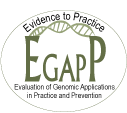More Workings of an Evidence-Based Genomic Panel: Modernizing the Evidence Review Process
Posted on by The independent EGAPP working group (EWG) held its 25th meeting on September 10-11, 2012 at the CDC campus in Atlanta. Highlights included:
The independent EGAPP working group (EWG) held its 25th meeting on September 10-11, 2012 at the CDC campus in Atlanta. Highlights included:
- Three EWG recommendation statements on the validity and utility of genetic tests are pending publication on:
- KRAS, BRAF and other markers involved in EGFR signaling, which are used to inform choice of therapies for metastatic colorectal cancer, recently submitted to Genetics in Medicine;
- Risk assessment for type 2 diabetes, in pre-submission peer-review; and
- SNP panels for prostate cancer risk assessment (based on a recently completed evidence review by investigators at the McMaster University AHRQ Evidence-based Practice Center), currently being finalized.
- Findings from evidence reviews, conducted through the AHRQ Effective Health Care Program (EHC), on PCA3 testing in the diagnosis and management of prostate cancer and CYP2C19 testing to guide antiplatelet treatment , were presented at the meeting. The EWG plans to develop corresponding recommendation statements, evaluating the validity and utility of these tests, based largely upon the findings of these reviews.
- The Knowledge Synthesis Center (KSC) will conduct systematic reviews on familial hypercholesterolemia and colorectal cancer screening – the latter topic is being done in conjunction with modeling by NCI/CISNET .
- The KSC is developing a manuscript for publication on methods and considerations for “binning findings from whole genome sequencing”.
In addition to issuing recommendation statements, a central mission of the EWG is to develop and test new methods for evidence-based evaluation of genomic tests. In accordance with this aim, earlier this month the EWG published Improving the efficiency and relevance of evidence-based recommendations in the era of whole-genome sequencing: an EGAPP methods update. The full text of the paper is freely accessible from the website of Genetics in Medicine. As implied by the title, the main thrust of the article is geared towards streamlining evidence review and recommendation processes, for example by triaging topics according to a minimum indication of clinical validity before proceeding with review of other aspects of the test (e.g., analytic validity and clinical utility), and intelligent use of decision modeling when there is no direct evidence supporting clinical utility.
Criticisms of evidence-based processes as requiring too much time, labor and expense are all too common. After all, a familiar argument goes, how can we expect that systematic reviews, which can take a team of trained investigators a year or more to complete, could possibly keep up with the rapidly evolving field of genomics? The experience of the EGAPP initiative has taught us that while discovery-based knowledge and resulting hype surrounding genomic applications does evolve and accumulate quite rapidly, quality information supporting the validity and utility of using these applications in health care typically does not. Nevertheless, this lopsided research environment has persisted and culminated in the impending dawn of routine clinical whole genome sequencing upon a health care system that is in large part unprepared to utilize, deal with or even understand the output. The newly published EGAPP methods update and the WGS binning manuscript in development describe different but complementary approaches designed to identify and report what is useful and actionable in the face of massive data. Neither of these EGAPP products will remediate the situation entirely, but they are productive initial steps towards collaboration with other groups and stakeholders towards a more responsive and nimble evidence-based genomics.